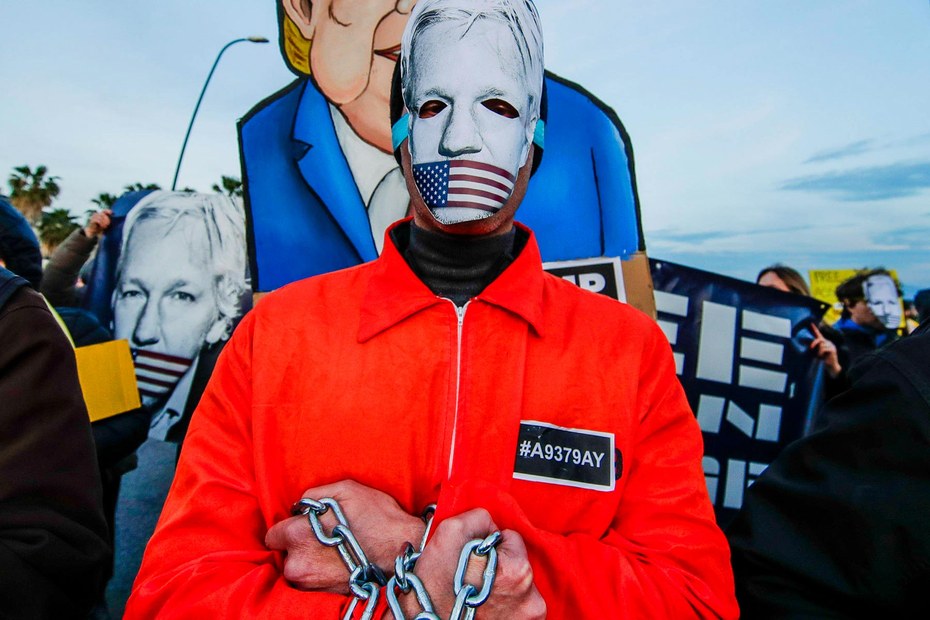Eine deutsche Version dieses Textes finden Sie hier.
On April 11th 2019, WikiLeaks founder Julian Assange was seized by British police from the Ecuadorian embassy, where he had lived under the protection of political asylum since mid 2012. As he was being carried out, shouting that “the U.K. must resist”, he held a copy of Gore Vidal’s “History of the National Security State” (2014). For the last five years, he has been held on remand in the high-security Belmarsh prison, nicknamed “Britain's Guantanamo Bay” due to its long-term detention of terrorism suspects without charge. Last year, in a letter sent to the newly coronated His Majesty King Charles III, Mr. Assange noted “the United Kingdom’s record as the nation with the largest prison population in Western Europe,” accompanied by “picturesque crows nesting in the razor wire and the hundreds of hungry rats.”
After a four-week trial in the fall of 2020 to decide whether he should be extradited to the United States, the judge ruled in his favour. Despite that win, he was ordered to remain in Belmarsh during the appeals process. Following a two-day hearing this February, two High Court judges essentially deferred the decision on whether to permit Mr. Assange to appeal to the U.K. Supreme Court until the U.S. government can possibly offer diplomatic assurances on a few issues: “that Mr Assange is permitted to rely on the First Amendment, that he is not prejudiced at trial (including sentence) by reason of his nationality, that he is afforded the same First Amendment protections as a United States citizen and that the death penalty is not imposed.” The deadline for the submission of those assurances is April 16th. A further hearing has been tentatively scheduled for May 20th.
“If assurances are not given then we will grant leave to appeal without a further hearing. If assurances are given then we will give the parties an opportunity to make further submissions before we make a final decision on the application for leave to appeal,” says the High Court judgment. In the event that the judges grant Mr. Assange no leave to appeal on any grounds, then proceedings in the U.K. will have been legally exhausted, and an appeal to the European Court of Human Rights (ECtHR) will be engaged. The ECtHR already confirmed back in December 2022 that they have received his preliminary application for appeal, and Stella Assange has said that “his lawyers would apply to the European judges for an emergency injunction if necessary” to ensure that Mr. Assange will not be extradited unless/until they have ruled on the matter.
As we approach the deadline for delivery of the assurances, we must ask three questions: Can the United States government provide assurances on any of these issues? If they can, why have they not provided such assurances already? And if the United States government violates the assurances, is there any recourse?
Diplomatic assurances, also referred to as “diplomatic guarantees,” are oral or written promises issued by one state, usually the head of state or at least high-ranking officials, to another regarding the transfer and treatment of a person of interest. They are commonly offered in the context of expulsion, deportation, or extradition proceedings, where the ‘receiving’ or ‘requesting State’ wants to pursuade the ‘sending State’ that the person to be sent is not at risk of an unfair trial, ill-treatment, torture, or the death penalty.
Leading up to the 2021 ruling of the U.K. High Court in favour of the prosecution, the U.S. government supposedly offered a ‘package’ of assurances “that Mr Assange will not be subject to SAMs or imprisoned at ADX (unless he were to do something subsequent to the offering of these assurances that meets the tests for the imposition of SAMs or designation to ADX). The USA has also provided an assurance that they will consent to Mr Assange being transferred to Australia to serve any custodial sentence imposed on him if he is convicted.” The judgment by Rt. Hon. Lord Chief Justice Ian Burnett of Maldon and Lord Justice Timothy Holroyde states that “there were no assurances before the judge,” Vanessa Baraitser, when she made her ruling against extradition in January 2021; “had the assurances been available to the judge she would have decided the oppression question differently.”
Just as the term ‘extraordinary rendition’ is a euphemism for state-sponsored kidnapping, special administrative measures (SAMs) are conditions of extreme solitary confinement. In 2017, the New York-based Center for Constitutional Rights released a report on the practice, which they allege “combin[es] the brutality and isolation of maximum security units with additional restrictions that deny individuals almost any connection to the human world.” According to the U.N. Standard Minimum Rules on the Treatment of Prisoners, or ‘Nelson Mandela Rules’, solitary confinement is defined as “22 hours or more a day without meaningful human contact,” and prolonged solitary confinement as “a time period in excess of 15 consecutive days” (Rule 44). Since at least 2011, the U.N. has called for “an absolute prohibition” against states subjecting prisoners to “indefinite and prolonged solitary confinement.” According to defense lawyer Jennifer Robinson and acting WikiLeaks editor-in-chief Kristinn Hrafnsson, Mr. Assange has already been subjected to this while in Belmarsh.
In arguing that the U.S. prosecution should not have been permitted to appeal, the Assange defense stated: “The approach adopted by the US in issuing conditional assurances only at this stage has gained them a tactical advantage at the expense of fairness and in a manner that has ensured Mr Assange’s prolonged detention even after the order for his discharge.”
Law professor Marjorie Cohn, during a public panel discussion following this recent High Court decision, pointed to the significant ‘unless’ clause in that previous assurance. “‘Unless’ somebody at the [Bureau] of Prisons decides, for some subjective reason which is non-reviewable, that he can be held in those conditions,” she clarified.
Her observations are supported by the testimonies of Joel Sickler, criminologist and prisoner advocate, and Maureen Baird, a former senior executive at the Federal Bureau of Prisons (BOP). During the 2020 trial, Sickler had stated that “a high profile foreign national who has fought extradition for years facing national security charges is unlikely to be placed in any situation short of the highest possible security in order to prevent any escape.” Furthermore, Baird said that if Assange were to object to a SAMs designation, any appeals he may attempt would be “an exercise in futility” because “I have never seen an inmate have SAMs removed, only extended.”
Professor Cohn continued: “There are cases, particularly a case from Spain, where the United States gave specific assurances, the person was extradited from Spain to the United States, and then the US backtracked on those assurances. So I think that it is going to be difficult for the United States to give airtight assurances.” She is likely referring to the case of David Mendoza-Herrarte, who was extradited to the United States in 2009 on drug trafficking charges. Despite assurances that Mendoza could serve the remainder of his prison sentence in Spain if convicted, once he was on U.S. soil, the U.S. judge argued that since he was not a signatory of the extradition treaty between Spain and the United States, he had no claim on any breaches of diplomatic agreements, if they existed at all. This was despite the fact that he had even signed a separate contract with U.S. and Spanish officials. His requests for prison transfer back to Spain were subsequently denied for several years until 2015, after that contract was leaked to him by a Spanish judge and he began winning in U.S. civil court. Journalist Richard Medhurst, who interviewed Mendoza, reported that in the meantime a French court blocked the extradition of Michael and Linda Mastro to the United States in June 2013, “citing Mendoza’s case as proof that France could not trust assurances from the United States.”
Regarding Mr. Assange’s case, “there were loopholes in almost every single assurance that was offered [by the U.S. government], but those were treated as ‘evidence.’ They were taken seriously by the High Court of Justice and they said there was no reason to doubt those assurances, even though [those assurances] were not part of the original extradition proceedings,” said independent journalist Kevin Gosztola on the same panel. Gosztola, author of “Guilty of Journalism: The Political Case Against Julian Assange” (2023), is one of a few journalists who have covered both the court martial of alleged source Chelsea Manning and the extradition case(s) of Mr. Assange in great detail for more than a decade.
Even if we could be confident that the United States would grant Mr. Assange the same rights and protections as an American citizen, 17 of the 18 counts against Mr. Assange are based on the Espionage Act, which has historically undermined such rights. “That doesn't mean they are going to grant him robust First Amendment rights or protections. They just can't.. treat him any worse than they would an American, and they’ve treated some Americans pretty badly,” observed Chip Gibbons, journalist and policy director for the D.C.-based legal advocacy not-for-profit organisation Defending Rights & Dissent (DRAD). Among them would be the late Dr. Daniel Ellsberg, whose prosecution in the 1970s was dismissed with prejudice only “three days before my trial came to an end, [because] evidence of unlawful wire tapping surveillance surfaced.” Manning’s 35-year sentence had been commuted in January 2017 by President Barack Obama on his way out of office, on the basis that – in his own words – she had already “served a tough prison sentence” that was “very disproportionate to what other leakers had received.”
Both the U.K. Official Secrets Act and the U.S. Espionage Act – despite multiple attempts at reform – do not even allow for a so-called public interest defense, in which a defendant would normally be able to justify their actions on the basis that the public’s right to know outweighs the consequences of unauthorized disclosure. Carey Shenkman, a constitutional law and international human rights attorney, testified during the 2020 trial that “the [Espionage] Act threatened First Amendment rights more than any federal statute passed in the previous century.”
In a ruling by the U.S. Supreme Court in June 2020, to determine whether imposing speech requirements or restrictions on foreign groups receiving federal funds was unconstitutional, the judges held that “as a matter of American constitutional law, foreign citizens outside U. S. territory do not possess rights under the U. S. Constitution.” By extension, this included “foreign organizations operating abroad,” even when they were “closely identified with American organizations” through an affiliate structure. It is unclear whether Mr. Assange, upon being rendered onto U.S. territory, would then acquire those rights despite still being a foreign national. Given that the United States at least espouses to a separation of powers between the judicial and executive branches of government, it would be improper (even if desirable for Mr. Assange’s situation) for the executive to dictate in advance how legal proceedings in the U.S. will be carried out, especially if that means violating Supreme Court precedent.
The general consensus for decades among human rights defenders has been that assurances are ineffective at best, and at worst actually undermine protections by implicitly downplaying the weight of obligations already established under international human rights law, particularly against torture. A June 2005 background briefing from the U.S.-based Human Rights Watch accused the United States of using assurances “to claim that these [extraordinary] renditions do not violate the absolute prohibition on renditions to risk of torture,” resulting in “numerous suspects [being sent] to countries with well-documented records of torture and ill-treatment.” A 2006 working paper from the Refugee Studies Centre at the University of Oxford begins by stating that “the concept of diplomatic assurances presents a paradox. They are used to exact guarantees of good behaviour from States that are known not to honour already established human rights obligations.” The United Nations’ reference document from the same year notes that “assurances given by the receiving State do not normally constitute legally binding undertakings. They generally provide no mechanism for their enforcement nor is there any legal remedy for the sending State or the individual concerned in case of non-compliance, once the person has been transferred to the receiving State.” A more recent 2017 briefing document by Amnesty International labels assurances, in short, as “inherently wrong, inherently unreliable.”
These criticisms are usually only applied to cases where the ‘sending State’ is a Western democracy, but specifically in the context of the assurances made thus far in Mr. Assange’s case, for an extradition between two Western democracies, Amnesty International holds the same ground: “these are inherently unreliable, it promises to do something and then reserves the right to break the promise.”
In the end, assurances seem more political than legal; therefore, the leveraging of diplomatic relations may have the greatest impact on the outcome of this case. On April 10th, prior to a joint press conference and White House state dinner with Japanese Prime Minister Kishida Fumio, President Biden was walking beside Kishida just outside the Oval Office when a pool reporter shouted from the Rose Garden, “Do you have a response to Australia’s request that you end Julian Assange’s prosecution?” Biden initially says, “Didn’t hear you.” The reporter repeats the question. Biden, continuing to walk towards an Office door and not making eye contact with the press, only responds with: “We’re considering it.” During a State Department daily press briefing the following day, spokesperson Matthew Miller was asked by journalist Ryan Grim if “the State Department [is] involved in these conversations with Australia.” Miller refrained from confirming or denying this, though he did attempt again to argue that Mr. Assange was charged for conduct that “has never been considered a legitimate journalistic practice.” He had been appointed as spokesperson by Secretary of State Antony Blinken nearly one year ago. Interestingly, in his own personal capacity, Miller has previously described the indictment against Mr. Assange as “dangerous and probably unconstitutional.”
“[The Department of Justice] doesn't get to decide who is deserving of first amendment protections and who isn't. There's a reason we wouldn't charge this in the Obama administration,” tweeted Miller in May 2019, regarding John Demers – then head of the Justice Department’s National Security Division – saying in a press briefing that “Julian Assange is no journalist.”
Last July, while visiting Canberra, Blinken himself had confirmed that “Assange had been discussed in annual talks with Foreign Minister Penny Wong.” Australian Prime Minister Anthony Albanese then “told reporters that Blinken’s public comments echoed points made by President Joe Biden’s administration during private discussions with Australian government officials.”
Albanese, and Mr. Assange’s U.S. defense lawyer Barry Pollack, described Biden’s most recent response as “an encouraging comment.” “There's nothing to be gained by Mr Assange's continued incarceration, in my very strong view, and I've put that as the view of the Australian government,” said Albanese to Sky News. Back in February, days before the U.K. hearings and following the successful passing of a motion (86 ayes and 42 noes) in the Australian House of Representatives to bring Mr. Assange home, Albanese had said that he has, “from the very first occassions where I had an opportunity as Prime Minister to, raised this issue at the highest levels with the United States and with the United Kingdom.” He further expressed that “it is not up to Australia to interfere in the legal processes of other countries, but it is appropriate for us to put [forth] our very strong view that those countries need to take into account the need for this to be concluded.”
Should the United States be trusted to hold true to any assurances it may soon provide? The British judges appear rather lonely in their high confidence. For most observers, in the words of Gore Vidal from the book that Assange carried, “these people are not to be believed.”







Was ist Ihre Meinung?
Kommentare einblendenDiskutieren Sie mit.